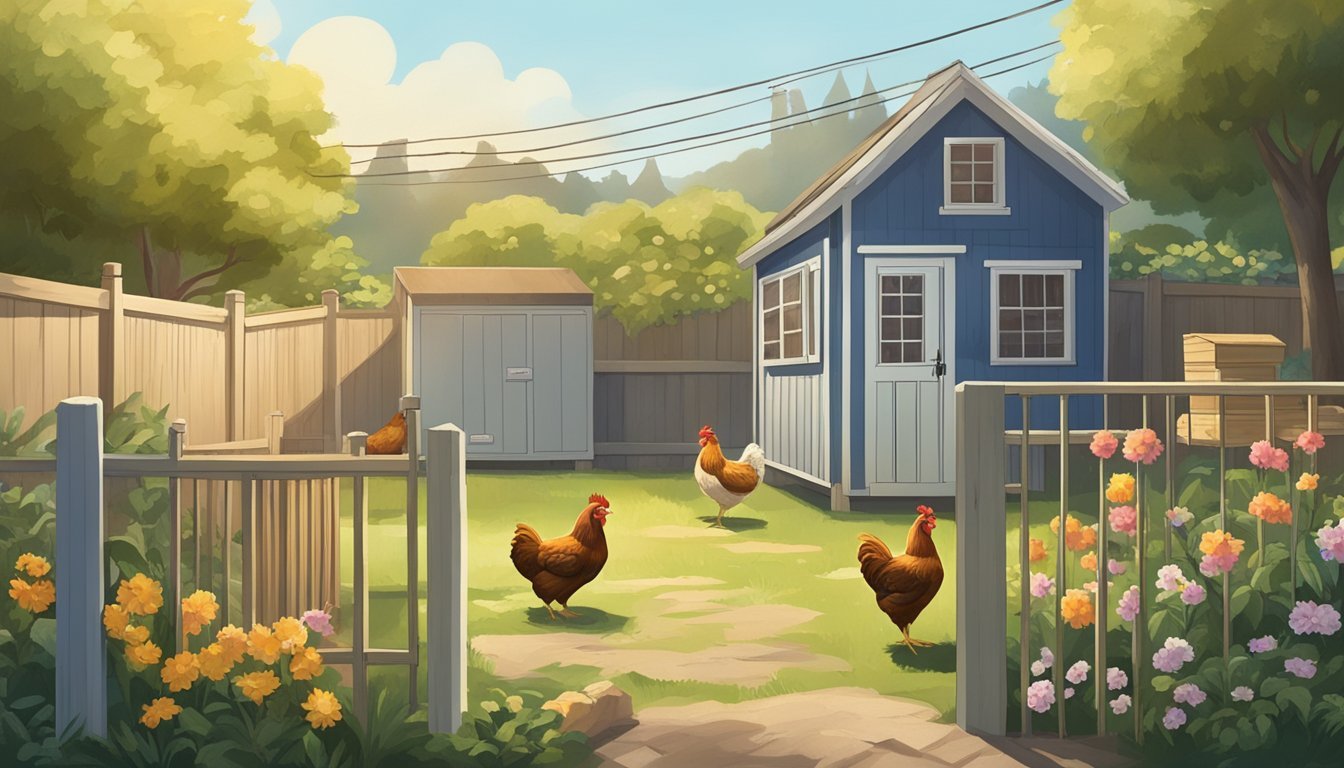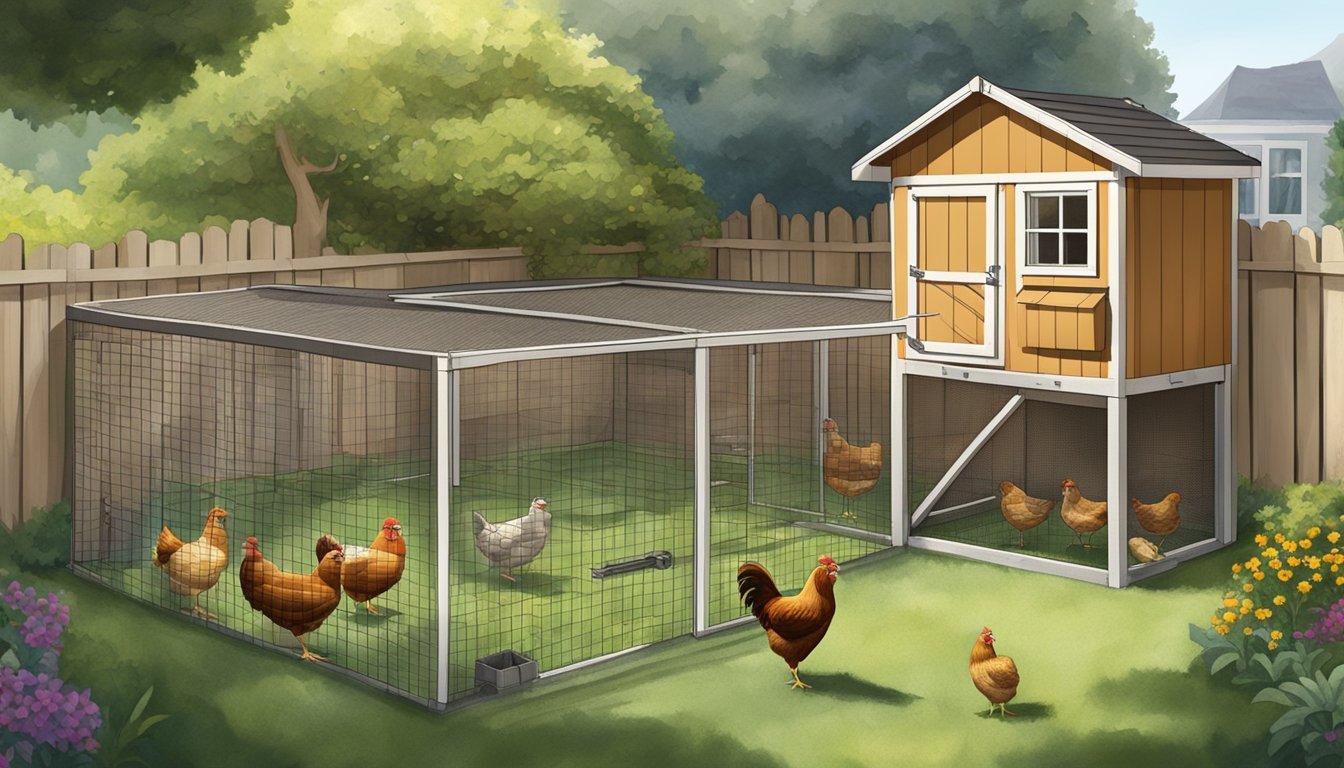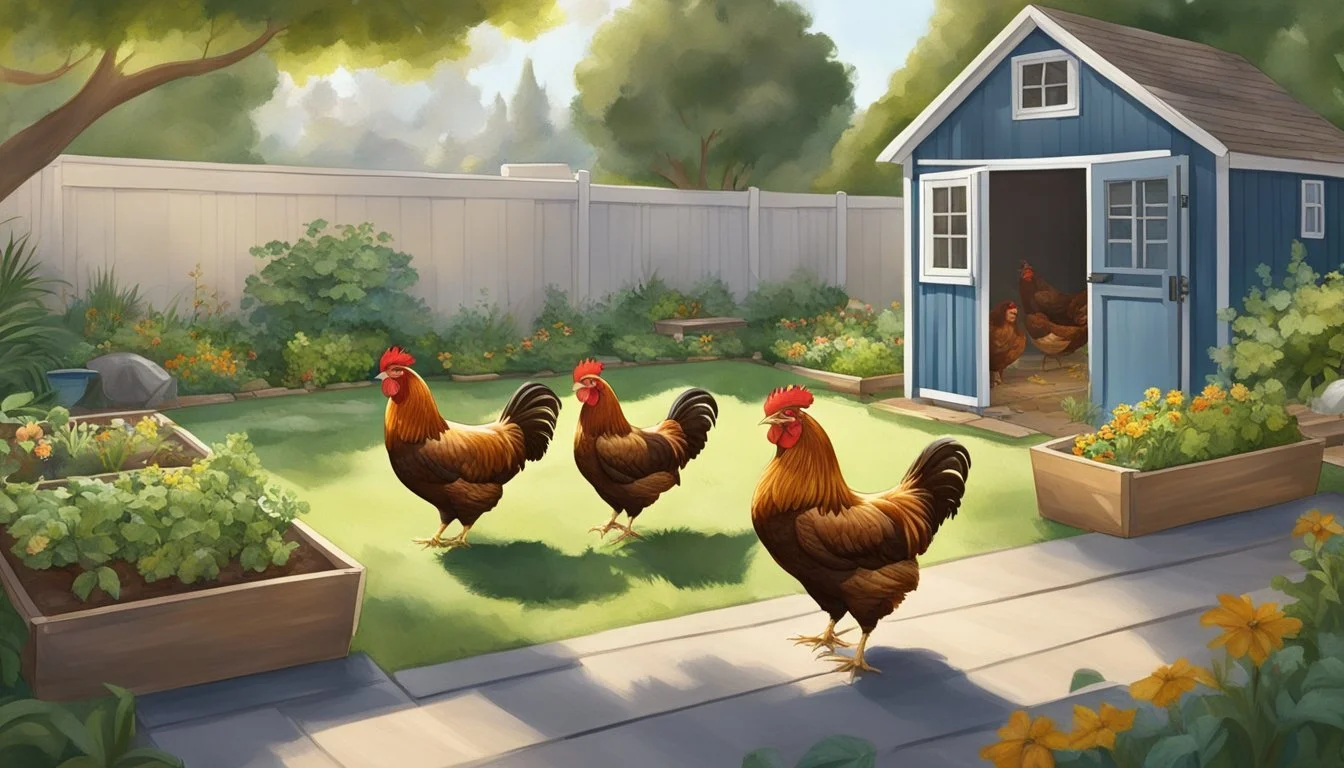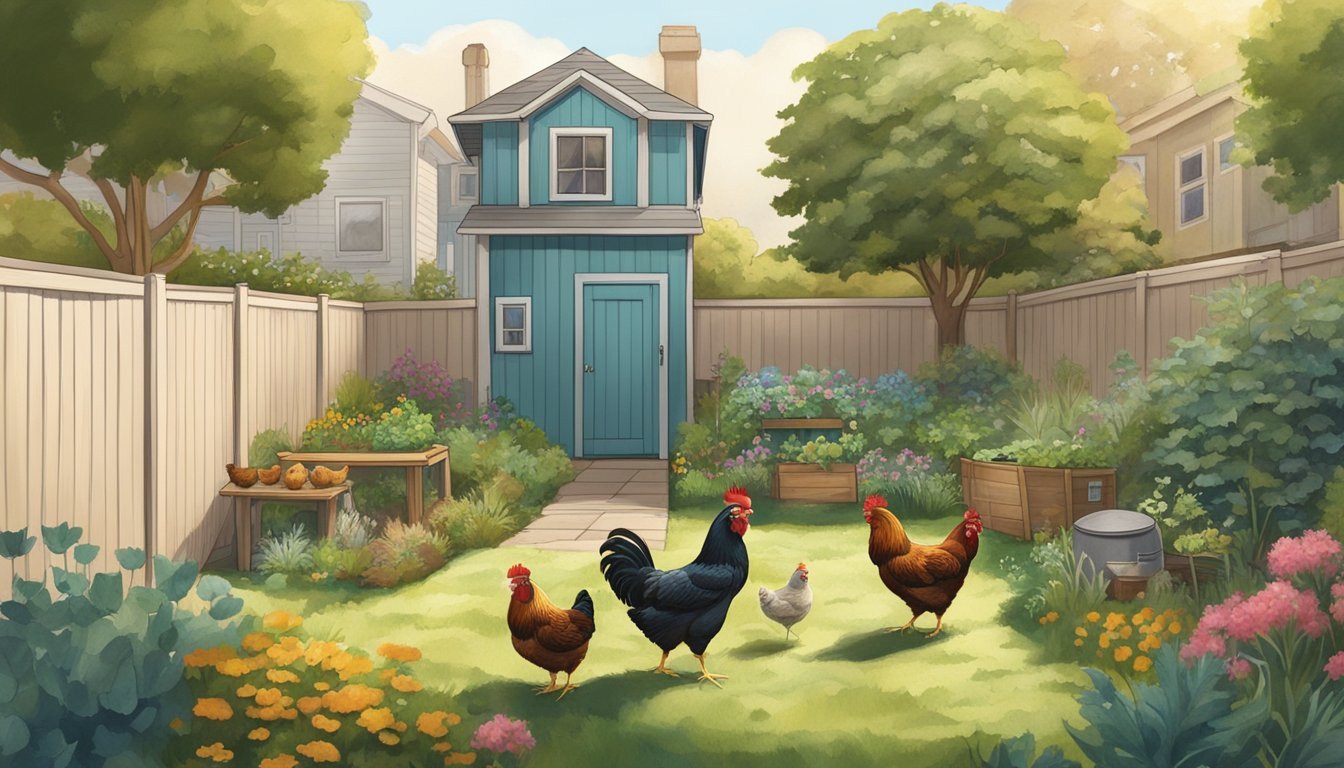Keeping Backyard Chickens in San Francisco, CA
Essential Guidelines for Urban Poultry Farming
In San Francisco, California, urban farming has gained popularity as residents embrace the idea of sustainable living through backyard chicken keeping. The city regulations are supportive of this green lifestyle, allowing individuals to maintain a small flock of chickens within the confines of their property. Not only does this hobby offer the pleasure of fresh eggs, but it also contributes to a sense of community among urban farmers and nature enthusiasts.
However, prospective and current chicken keepers must navigate specific guidelines to ensure their activities align with city ordinances. San Francisco permits up to four chickens per household, ensuring manageable flock sizes in urban environments. The laws also serve to minimize potential nuisances to neighbors by prohibiting the keeping of roosters, which are known for their early morning crowing. Compliance with these rules ensures that the experience of rearing chickens is enjoyable and beneficial for all involved.
The well-being of backyard chickens and the cleanliness of their living conditions are paramount. The city stipulates that coops be maintained in a sanitary manner and be positioned a certain distance away from residential structures. Chicken enthusiasts must be diligent in their husbandry practices, providing adequate space, protection, and care for their poultry to thrive in an urban setting. Through conscientious management of backyard flocks, San Francisco residents can enjoy the rewards of fresh, homegrown produce while adhering to the city's commitment to a harmonious and eco-friendly urban ecosystem.
Legal Framework for Keeping Chickens
The legalities surrounding the keeping of backyard chickens in San Francisco are specific and must be adhered to by residents. This framework sets clear guidelines for urban poultry farming.
Understanding San Francisco's Chicken Ordinance
Under the San Francisco California Chicken Ordinance, residents are dictated specific rules regarding the ownership of backyard chickens. These rules include:
Maximum Number of Chickens: Homeowners are allowed up to four chickens on their property.
Rooster Prohibition: Roosters are not permitted within the city limits, mainly to prevent noise complaints.
Coop Requirements: Coops must adhere to certain size specifications and must be positioned in a manner consistent with local health and safety regulations.
Additionally, residents must check with local zoning ordinances for any specific regulations that apply to their area.
Comparison with Other California Cities
Regulations for backyard chickens vary across California. Some of the distinct differences found in major cities include:
Los Angeles: Similar to San Francisco, up to four chickens are allowed, but coops must be kept at least 20 feet from the owner's residence and 35 feet from any other dwelling.
Oakland: Residents can keep up to 20 chickens, depending on lot size, but roosters are also prohibited.
Sacramento: The city allows up to three chickens, and no permit is required.
San Diego: Up to five chickens can be kept in most areas, with restrictions on coop placement similar to Los Angeles.
San Jose: Up to six hens are allowed, with no roosters permitted, and there are specific guidelines for coop construction and placement.
Bakersfield and Alameda County: Regulations differ and residents need to consult their specific city and county ordinances.
Each California city—including but not limited to Los Angeles, Oakland, Sacramento, Bakersfield, and San Diego—have their own set of local laws that regulate the keeping of chickens. It is imperative that residents review their local laws to ensure compliance with all relevant regulations.
Getting Started
When embarking on the journey of keeping backyard chickens in San Francisco, CA, one must be well-informed about the city's specific requirements. These include securing the right permits, understanding zoning and property regulations, and being aware of limitations on the number and type of chickens allowed.
Securing the Necessary Permits
Keeping backyard chickens in San Francisco requires a permit. The city mandates residents to obtain a permit through the San Francisco Animal Care and Control before setting up a coop. Applicants should review the guidelines provided by the city’s Planning Department to ensure successful permitting. It's important to note that permit requirements can change, so staying updated with the latest ordinances is essential.
Zoning and Property Regulations
San Francisco's zoning regulations determine where and how residents can keep chickens. Homeowners should check with the city’s zoning department to verify that their property is zoned appropriately for the keeping of livestock. Additional restrictions may apply, such as:
Distance requirements: Coops and henhouses must be set at a certain distance from neighboring dwellings.
Property size: Sometimes, the size of the property affects the number and type of animals permitted.
Adherence to these regulations is mandatory to ensure compliance with local laws and to maintain community standards.
Number and Type of Chickens Allowed
The city of San Francisco allows residents to keep a certain number of chickens. The limit is typically up to four hens. It's pivotal for prospective chicken owners to know:
Roosters are not allowed due to noise concerns.
The limit on the number of hens helps prevent overcrowding and ensures the welfare of the chickens.
By navigating these regulations confidently and knowledgeably, San Francisco residents can enjoy the benefits of raising chickens within the parameters set by local laws.
Chicken Coop Essentials
When setting up a backyard chicken coop in San Francisco, it's crucial to focus on design, cleanliness, and ventilation. These elements are key to ensuring a safe and comfortable environment for the chickens.
Designing a Coop
A coop is not just a shelter but a space that must cater to the chickens' needs for security, space, and comfort. In San Francisco, a coop should be designed to accommodate a maximum of four chickens, as local regulations stipulate. Each chicken requires at least 4 square feet of space, therefore, a coop should be no smaller than 16 square feet. The coop must be predator-proof with solid walls, flooring, a secure door, and strong wire on windows. Positioning the coop within the backyard requires compliance with city ordinances, ensuring it does not encroach on property lines and is situated away from neighboring dwellings.
Maintaining Cleanliness
Cleanliness is paramount for maintaining the health of backyard chickens and the overall hygiene of the surrounding area. It is essential to plan for regular cleaning when designing the coop. Floors should be covered with absorbent materials, like straw or wood shavings, which are easy to remove and replace. San Francisco regulations suggest that any complaints of odors or pests from neighbors may trigger a visit from city health officials, underscoring the importance of cleanliness.
Providing Adequate Ventilation
A well-ventilated coop ensures continuous air flow without causing drafts in the living space of the chickens. Strategic placement of vents or windows just under the roofline allows for the escape of warm, moist air, making the coop less hospitable to pathogens and parasites. In San Francisco's mild climate, adequate ventilation reduces the risk of respiratory issues and helps maintain a dry and clean environment within the chicken coop.
Chicken Health and Welfare
Keeping backyard chickens in San Francisco requires understanding their health and welfare needs. This ensures not only a thriving flock but also the safe production of eggs and a healthy living environment.
Feeding and Nutrition
Chickens must be provided with a balanced diet to maintain their health and the quality of eggs they lay. Their diet should consist of:
Starter feed: For chicks up to 6 weeks old, rich in protein.
Grower feed: From 6 to 20 weeks, with a protein content adjusted for growth.
Layer feed: For hens laying eggs, with increased calcium for shell production.
Additionally, one can supplement with grains, vegetables, and occasional treats to ensure hens receive all necessary nutrients.
Preventing Diseases and Parasites
A major concern in raising backyard chickens is the prevention of disease and parasites. To maintain a healthy flock:
Vaccinate: Follow recommended vaccination schedules to prevent common poultry diseases.
Biosecurity: Implement measures to reduce the risk of disease spread, such as controlling access to the flock and disinfecting tools and equipment.
Parasite control: Regularly inspect chickens for signs of parasites, such as lice and mites, and apply appropriate treatments as necessary.
By proactively managing health risks, one can minimize the incidence of disease and maintain a vigorous flock.
Routine Care and Handling
Regular care is critical to a chicken's welfare and includes:
Inspections: Regularly check each chicken for signs of illness or injury.
Housing: Maintain clean and well-ventilated coop space to reduce waste buildup and the risk of respiratory issues.
Handling: Gently handle chickens to reduce stress and prevent injury.
Additionally, it is essential to manage waste appropriately, as accumulated droppings can lead to health problems for the chickens and attract pests.
Community and Environmental Considerations
Keeping backyard chickens in San Francisco comes with responsibilities toward the community and the environment. It involves careful management of waste, maintaining good neighbor relations, and anticipating interactions with local wildlife.
Managing Waste and Compost
Sustainable waste management is crucial when keeping chickens. Their waste can be composted, but it must be done correctly to prevent odors and attractants for pests. San Francisco’s local regulations may specify methods for composting chicken manure. A compost bin should be properly aerated and turned regularly to facilitate the breakdown of chicken poop into a nutrient-rich addition for gardens.
Key practices include:
Aeration of compost piles to reduce smell
Regular turning to speed up the decomposition process
Neighbor Relations and Noise Control
Communicating with neighbors and controlling noise are important to foster a positive community atmosphere. Since roosters are prohibited due to their crowing, only hens are allowed within city limits, thereby controlling potential noise issues. Property owners should ensure their chicken coop is well-maintained and that the fences separating the chickens from neighboring properties are secure and high enough to prevent any escape.
Considerations for neighbor relations:
Informing neighbors about the intent to keep chickens
Promptly addressing any concerns they may have
Local Wildlife Interactions
Backyard chickens can attract predators and pests, hence a robust coop and secure fencing are necessary to protect the chickens. Livestock owners should be aware of potential threats from local wildlife such as raccoons and ensure their chickens have a safe enclosure, particularly at night.
Measures to safeguard chickens from wildlife:
Reinforced coop structures resistant to predators
Secure fencing around the property
Practical Tips for Raising Chickens
Successfully raising chickens in San Francisco involves understanding local regulations, recognizing chicken behavior, and integrating poultry with your gardening efforts. This section provides targeted advice to ensure your backyard flock thrives under your care.
Daily Management and Activities
Keeping chickens requires a commitment to daily tasks to maintain their health and well-being. A chicken's basic needs include regular feeding, clean water, and clean bedding. Feeders and waterers should be checked and refilled daily. Nesting boxes should be monitored and eggs collected at least once a day. Proper coop cleaning is crucial to prevent disease; a thorough clean every few weeks coupled with regular spot cleaning works best. It's also essential to perform routine health checks on your chickens for signs of distress or illness.
Chicken Behavior and Personality
Chickens are social creatures with distinct personalities and social structures, often referred to as a "pecking order." Observing chickens can reveal a range of behaviors from the curious and bold to the shy and reserved. To maintain harmony, provide adequate space in both the coop and run, allowing chickens to establish their hierarchy without causing harm to each other. Ample space reduces stress and discourages negative behaviors such as pecking and bullying.
Behavior Type Description Recommended Action Curious Investigating new objects or changes Allow exploration but ensure safety Shy Hesitation or avoidance of interaction Avoid forcing contact; offer treats Bullying Aggressive behavior towards others Monitor and separate if necessary Broodiness Sitting on eggs to hatch them Provide a secure space if intending to hatch
Understanding and catering to these behaviors is key for a harmonious flock.
Integrating Chickens with Gardening
Chickens can be beneficial for gardens by providing natural pest control and contributing to soil health through their waste, which can be used as fertilizer. However, they also tend to dig and may damage delicate plants. To integrate chickens with a garden:
Fence off delicate areas to protect plants.
Allow chickens to forage in areas that are robust or could benefit from their scratching and natural pest control.
Collect and compost chicken manure before adding it as a rich fertilizer for plants.
Planning the garden layout and chicken access strategically will result in mutual benefits for the garden and the chickens alike.
Slaughtering and Consumption
When keeping backyard chickens in San Francisco, California, there are specific regulations and considerations that apply to the slaughtering and consumption of these animals.
Legal Guidelines for Slaughter
California state law and San Francisco city ordinances dictate the legal framework for the slaughtering of backyard chickens. It is essential for residents to verify current regulations with local authorities as state and municipal laws may change. The focus should be on ensuring that any slaughter conducted is within the legal boundaries set by the state of California and the city of San Francisco. Typically, these laws are in place to ensure public health and animal welfare.
Humane Practices
While specific humane slaughtering techniques are not detailed in this section, the expectation is that all slaughtering should adhere to humane practices to prevent undue suffering of the animals. This means that individuals engaging in the slaughter of chickens must do so with consideration for the animal's welfare and in a manner that is quick and minimizes pain.
It is recommended that individuals consult with experts or refer to guidelines provided by animal welfare organizations for best practices in humane slaughter. Adherence to these practices is not just a matter of legality but also of ethical responsibility.








